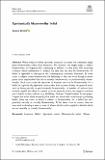Files in this item
Epistemically blameworthy belief
Item metadata
| dc.contributor.author | Brown, Jessica Anne | |
| dc.date.accessioned | 2019-12-17T15:30:08Z | |
| dc.date.available | 2019-12-17T15:30:08Z | |
| dc.date.issued | 2019-12-14 | |
| dc.identifier | 263712714 | |
| dc.identifier | f38ba521-29f3-4162-8268-5ada7ab73b3f | |
| dc.identifier | 85076853038 | |
| dc.identifier | 000575859000001 | |
| dc.identifier.citation | Brown , J A 2019 , ' Epistemically blameworthy belief ' , Philosophical Studies , vol. First Online . https://doi.org/10.1007/s11098-019-01384-z | en |
| dc.identifier.issn | 0031-8116 | |
| dc.identifier.other | ORCID: /0000-0002-1149-4814/work/69029146 | |
| dc.identifier.uri | https://hdl.handle.net/10023/19150 | |
| dc.description.abstract | When subjects violate epistemic standards or norms, we sometimes judge them blameworthy rather than blameless. For instance, we might judge a subject blameworthy for dogmatically continuing to believe a claim even after receiving evidence which undermines it. Indeed, the idea that one may be blameworthy for belief is appealed to throughout the contemporary epistemic literature. In some cases, a subject seems blameworthy for believing as she does even though it seems prima facie implausible that she is morally blameworthy or professionally blameworthy. Such cases raise the question of whether one can be blameworthy for a belief in a specifically epistemic sense rather than in some already recognised sense, such as being morally or professionally blameworthy. A number of authors have recently argued that there is a moral or social sense in which one ought to conform one’s beliefs to the evidence (e.g. Goldberg, Graham, Vanderheiden). In this paper, I argue that even while accepting that there are moral and social norms governing belief, there are cases in which a subject is blameworthy for a belief but isn’t plausibly morally or socially blameworthy. If this latter view is correct, then we may need to develop a new account of blame which can be applied to beliefs which are not morally or socially blameworthy. | |
| dc.format.extent | 20 | |
| dc.format.extent | 285262 | |
| dc.language.iso | eng | |
| dc.relation.ispartof | Philosophical Studies | en |
| dc.subject | Assertion | en |
| dc.subject | Belief | en |
| dc.subject | Epistemic norms | en |
| dc.subject | Blameworthy belief | en |
| dc.subject | Blame | en |
| dc.subject | B Philosophy (General) | en |
| dc.subject | T-NDAS | en |
| dc.subject.lcc | B1 | en |
| dc.title | Epistemically blameworthy belief | en |
| dc.type | Journal article | en |
| dc.contributor.institution | University of St Andrews. Arché Philosophical Research Centre for Logic, Language, Metaphysics and Epistemology | en |
| dc.contributor.institution | University of St Andrews. Philosophy | en |
| dc.identifier.doi | https://doi.org/10.1007/s11098-019-01384-z | |
| dc.description.status | Peer reviewed | en |
This item appears in the following Collection(s)
Items in the St Andrews Research Repository are protected by copyright, with all rights reserved, unless otherwise indicated.

